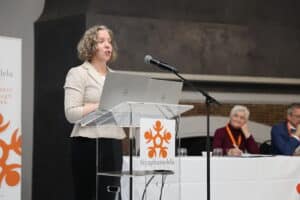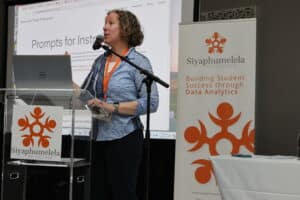Susan Adams, ATD’s associate director of teaching and learning, recently returned home after serving as an invited ATD speaker on artificial intelligence (AI) in higher education at Siyaphumelela’s annual conference, held June 25–28 in Johannesburg, South Africa. In this blog, she shares her experiences at the conference as well as her insights on proactive, responsible experimentation with AI, its ability to impact educational outcomes, and the importance of cultural sensitivity and diversity in the development of its systems.
It was a privilege to deliver both a keynote address and a master class on artificial intelligence at the Siyaphumelela conference in South Africa earlier this summer. Siyaphumelela, meaning “We succeed” in Xhosa, is a network organization dedicated to supporting educational transformation. Organized by ATD’s decade-long partnership with the South African Institute for Distance Education (Saide), the conference showcased Saide’s commitment to transforming education through open learning principles. These principles are centered on the use of open educational resources and open education as pedagogy, aiming to make learning more accessible and adaptable.
Supported by The Kresge Foundation, the conference brought together innovative and forward-thinking educational leaders ready to drive reform. This gathering served as an exceptional platform for exploring how AI can enhance educational systems and foster a responsible and open approach to technology, uniting educators eager to understand how to explore AI’s full potential while navigating its ethical landscape.
Returning to South Africa wasn’t just a revisit; it was a profound journey enriched by my past experiences of bringing U.S. students to study here in the late ’90s and the stories of my mother, who spent part of her childhood on a farm in Botswana and attended school in Pietermaritzburg. These personal connections not only brought me closer to the landscapes where my family once walked but also deepened my appreciation for the rich tapestry of cultural and geographical nuances that Southern Africa embodies.

Susan Adams delivers her keynote address, titled “Uniting Tradition & Technology: Humanistic AI in South African Education.”
During my keynote, I emphasized the importance of proactive experimentation and engagement with AI, particularly as a means for AI to absorb and learn the Global South. This kind of perspective is echoed by OER Africa, an initiative of Saide, which advocates for inclusion of data from the Global South through its campaign for open data sets. Without it, we cannot ensure that AI systems develop with a comprehensive understanding of diverse cultural contexts and local needs. Ensuring cultural sensitivity and equity in technology is essential for creating AI that benefits all global communities.

Adams’ master class workshop featured an AI Integration Challenge in which teams were tasked with creating their own generative AI tools to address a student affairs challenge.
The audience’s response was overwhelmingly positive and illuminating. A math professor commented, “Your presentation made my dean finally ask why we aren’t using AI in the classroom right now.” A Ph.D. student was inspired to focus their research on AI and education design, reflecting the direct influence of the session. A dean shared that the talk provided “significant insights,” despite not having used AI personally. Additionally, a student thanked me for boosting their confidence to engage with AI, and a vice-chancellor acknowledged the significance of the technology, admitting, “I now understand that this is a big deal, not just the hype I thought it was.”
The vision we set forth came alive in a two-hour master class featuring an AI Integration Challenge. In this transformative session, I empowered teams to craft their own generative AI tools using ChatGPT’s “Create” feature, each addressing a unique student affairs challenge. It was profoundly inspiring to see these teams in action, passionately crafting solutions like math tutoring systems, a career counseling GPT, and an AI-enhanced academic advising system by the University of the Free State. Witnessing the immediate impact of AI in enhancing educational outcomes was a powerful testament to the potential of this technology to revolutionize learning environments.
Throughout the conference, my message was clear and unwavering: We are all essential to the ethical deployment and responsible development of AI. Through hands-on practice and experimentation, a profound commitment was ignited among us, and a shared vision crystalized — one where AI and education not only coexist but thrive together, enhancing human potential across the globe. This conference has undoubtedly planted seeds for future dialogues and initiatives, and I eagerly anticipate watching these ideas flourish.
Watch the keynote address:
Learn more about ATD’s partnership with Saide in South Africa.